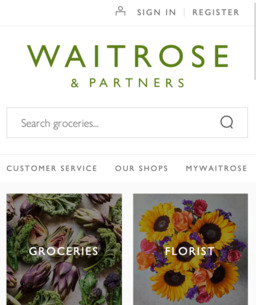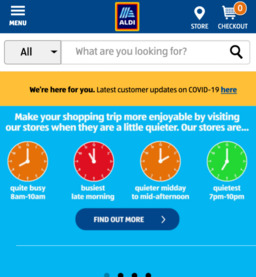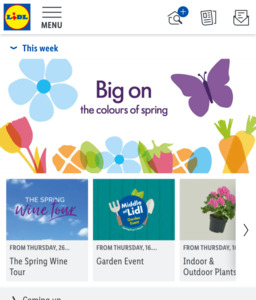
Grocery supermarkets are in fierce competition with one another to attract customers and increase their market share. They are always trying to lure customers with various offers and promotions. It is a fast changing market and hard to keep up with which companies have the best deals on the market right now, who are offering great quality food and providing the best services.
We have compiled a list of 10 best grocery supermarkets in the UK at the moment based on their market share, customer ratings and social media trends.
- Waitrose
- Aldi
- Lidl
- Teso
- Sainsburys
- Asda
- Iceland
- Morrisons
- Co-op
- Ocado

1. Waitrose
Waitrose & Partners is a brand of British supermarkets, selling groceries as part of Britain’s largest employee-owned retailer, the John Lewis Partnership. Its head offices are located in Bracknell and Victoria, England. Waitrose has focused on the food and drinks market, deciding not to diversify as big four retailers.
Key facts
- Waitrose & Partners has 338 shops across the United Kingdom, including 65 “little Waitrose” convenience shops
- It currently has 5.1% market share, making it the 8th largest retailer of groceries in the UK.
- They also export products to 52 countries and have locations in the Middle East
- Waitrose lovelife is the healthy range of discounted Waitrose products that promote healthy living.
- Heston range includes products inspired or created by the celebrity chef Heston Blumenthal.
- Waitrose’s myWaitrose loyalty card gives cardholders access to exclusive competitions and offers
- In 2010, Waitrose began a price guarantee, matching prices of 1000 items with Tesco. In 2012, it extended this campaign to 7000 items
- Some Waitrose shops incorporate an in-house restaurant selling hot and cold food
- Waitrose offers a self-service system known as ‘Quick Check’, allowing customers to scan and pack items as they are taken from the shelf.

2 Aldi
Aldi was first started in Germany by two brothers, in the 1940’s. It is now one of the largest discount supermarkets, boasting over 10,000 locations across various countries. It aims to deliver a no-frills grocery shopping experience with a customer first approach. It offers everyday low prices and a quick-and-easy shopping experience with only four to five aisles.
Key facts
- Aldi supermarket chains has over 10,000 stores in 20 countries,
- It has an estimated combined turnover of more than €50 billion.
- It launched in Great Britain, on 5 April 1990, in Stechford, Birmingham
- Aldi has now approximately 874 outlets in the UK and plans to have 1,200 stores by 2025
- Aldi stores are noted as examples of so-called no-frills stores that often display a variety of items at discount prices
- It specializes in staple items, such as food, beverages, toilet paper, sanitary articles, and other inexpensive household items.
- Many of its products are own brands, with the number of other brands usually limited to a maximum of two for a given item
- Aldi mainly sells exclusively produced, custom-branded products, popular brand names include Grandessa, Happy Farms, Millville, Simply Nature, and Fit & Active.
- Aldi has weekly special offers on expensive products such as electronics, tools, appliances, or computers.
- Discount items can include clothing, toys, flowers and gifts.

3. Lidl
The Lidl brand was founded in Germany and has grown a great deal to become one of Europe’s leading food retailers. High quality. Low prices. Hassle-free shopping that gets you in and out. They boast about sourcing locally where possible, and approximately two thirds of their products are sourced from British suppliers.
Key facts
- It’s actually pronounced Lee-dull – but the firm now accepts the way Brits say it.
- Lidl opened its first stores in 1973 and by the 1980s it had rapidly become a favourite with shoppers.
- It operates over 10,000 stores across Europe and the United States
- The first 10 UK stores opened in September 1994.
- It has over 760 stores across Great Britain employing over 22,000 people.
- In 2008 the opening of a store in Southall, West London, caused a stampede, forcing security guards to close its doors.
- As well as Italian and Spanish weeks in UK stores, Lidl has English weeks, with Cheddar and real ales, in foreign stores.
- The firm calls its shoppers “Lidlers”.
- It sells 100,000 lobsters at Christmas.
- A quarter of Lidlers are from A and B socio-economic groups: upper-middle class and middle-class professionals.
- Stores are kept small with limited products so shoppers can do a full weekly shop in 20 minutes
- Lidl has a smaller range of products, selling 1,500 to 1,600 lines including 330 branded lines, compared with the 15,000 items usually found in large supermarkets.

4. Teso
Tesco is the third-largest retailer in the world by gross revenues and the ninth-largest retailer in the world by revenues. In the UK Tesco now has over 2,200 stores ranging from the large Extra hypermarket style stores to small Tesco Express high street outlets.
Key facts
- Tesco is headquartered in Welwyn Garden City, Hertfordshire, England, United Kingdom
- Tesco has over 2,200 stores in the UK ranging from the large Extra hypermarket style stores to small Tesco Express high street outlets.
- Originally a grocery and general merchandise retailer Tesco has now diversified to include banking, insurance services, electrical goods and mobile services to its ranks.
- Tesco’s was one of the first to let people buy grocery online, more than one million users now shop regularly with Tesco online.
- Tesco Extra shops are larger, mainly out-of-town hypermarkets that stock nearly all of Tesco’s product ranges.
- Tesco Superstores are standard large supermarkets, stocking groceries and a much smaller range of non-food goods than Extra hypermarkets.
- Tesco Express shops are neighbourhood convenience shops, stocking mainly food with an emphasis on higher-margin products such as sweets, crisps, chocolate, biscuits, fizzy drinks and processed food alongside everyday essentials.
- Express shops are located in busy city-centre districts, small shopping precincts in residential areas, small towns and villages
- Tesco Metro shops are sized between Tesco superstores and Tesco Express shops. They are mainly located in city centres beside railway stations, the inner city and on the high streets of towns.
- Tesco also sells petrols at most Superstore and Extra locations.

5. Sainsbury’s
Sainsbury’s is one of the oldest grocery supermarkets in the UK, trading for over 147 years. What started as a one small rented store in Drury Lane is now a supermarket giant with over 1200 stores across the United Kingdom.
Key facts
- Sainsbury’s is the second largest chain of supermarkets in the United Kingdom, with a 16.0% share of the supermarket sector
- Founded in 1869, by John James Sainsbury with a shop in Drury Lane, London, the company became the largest retailer of groceries in 1922.
- Sainsbury’s was a pioneer in the development of own-brand goods; the aim was to offer products that matched the quality of nationally branded goods but at a lower price
- Sainsbury’s supermarkets are shops that all have similar layouts and operations, most will have a convenience kiosk, produce, meat, fish, groceries and frozen food, and manned and self-service checkouts.
- Sainsbury’s operates a chain of fuel forecourts located at some of its supermarkets selling diesel, petrol and City Diesel.
- A number of stores operate self-service cafes that run as long as the shops are open
- There are 370 Sainsbury’s Local stores up and down the country. They are a smaller version of the Sainsbury’s superstore selling a smaller range of goods
- Sainsbury’s operates an internet shopping service branded as “Sainsbury’s Online”.

6. Asda
Asda iis one of Britain’s leading supermarket retailers. they serve customers from their network of stores and online services, including supercentres, superstores, supermarkets, Living stores, petrol filling stations and depots across the UK.
Key facts
- More than 18 million people shop with Asda every week
- Around 98 per cent of UK homes are covered by Asda services.
- Asda supercentres are largest asda stores offering extended range across food and non-food
- Asda Milton Keynes is the largest supercentre, measuring at more than 100,000 sq.ft.
- Superstores are the most common format, accounting for a large majority of stores.
- Superstores include a large collection of fresh foods, Cafes, Pharmacy, Optician, larger George and non-food offers.
- Asda supermarkets are small stores that are deployed across the UK that specifically serve essential foods and non-food items.
- You can order online and collect from all Asda Supermarkets.
- Asda Living stores sell non-food products like Home, Fashion and general merchandise
- Asda Petrol Filling Stations offer both pay-at-pump and pay-at-kiosk services, as well as a small convenience store that sells travel friendly products.

7. Iceland
Iceland Foods Ltd is a British supermarket chain headquartered in Deeside, Wales. It has an emphasis on the sale of frozen foods, including prepared meals and vegetables. They also sell non-frozen grocery items such as produce, meat, dairy, and dry goods.
Key facts
- Iceland began business in 1970, when Malcolm Walker opened the first store in Leg Street, Oswestry, Shropshire, England, with his business partner Peter Hinchcliffe.
- Together, they invested £60 for one month’s rent at the store.
- Iceland now has stores in 250+ locations employing 23000 people.
- The company has an approximate 2.2% share of the UK food market.
- Iceland initially specialised in loose frozen food.
- Iceland also operates stores in Spain and Portugal in conjunction with Spanish-based retailer Overseas
- The company has more recently made large scale changes to its promotions. In the past “Buy One Get One Free” and Meal Deals were common in stores. These have now been reduced and replaced with products offering bigger packs at the original prices.
- The pricing system has also been changed with many products having their prices rounded up or down to the nearest multiple of 25p, this is known as Clear Cut Prices.
- 2006 also saw a huge surge in ‘Home Delivery’ promotion. This service is now one of the main focuses of the company.
- When a customer spends £20 or more whilst shopping in store, they have the option of free same-day or next-day home delivery, from available time slots.
- Customers can also shop online and receive free home delivery if they spend more than £35 online.
- Iceland “Bonus Card” is a loyalty card that allows customers to save money onto the card, with Iceland putting £1 onto the card each time a customer saves £20, and also gives occasional discounts, offers, and entry to competitions.

8. Morrisons
Started as an egg and butter stall in Rawson Market, Bradford, England, Morrisons is now the fourth largest food retailer chain in the UK with over 500 stores. Morrisons source and process a large range of food items in their own manufacturing facilities, giving them close control over the source and quality. They also have more people preparing food in store than any other supermarket.
Key facts
- It began as an egg and butter stall in Rawson Market, Bradford, England.
- It has now more than 498 superstores across England, Wales and Scotland employing over 110,000 people.
- Morrisons’ market share is around 10.14%.
- It serves around 11 million customers each week.
- Morrisons stocks thousands of lines sold under their own brands. These include M Savers, an economy brand including items ranging from food and drink to toiletries,
- Most Morrisons superstores have produce in Market Street.
- In 2012, the group launched its first retail website called “Morrisons Cellar”

9. Co-op
Co-op Food, is a brand devised for the food retail business of the consumer co-operative movement in the United Kingdom. The brand is a federation of over 15 different co-operative societies which operate over 4,000 shops, and does not represent one single food retail business.
Key facts
- Co-op has 4,050+ shops across the UK
- At its peak in the 1950s it had 30% of market share, now it’s around 6.4%.
- Co-op shops are of various sizes incorporating convenience shops and supermarkets
- Co-op Food offers customers a free online grocery delivery and collection service in certain UK postcodes through the website
- Members of The Co-operative Group and participating regional societies earn one membership point for every £1.00 spent at The Co-operative Food.
- In September 2016, The Co-operative Group launched a new meaningful membership, which means when a member purchases Co-op products and services, 5% of the money will come back to the member, and 1% of the money spent will go to the member’s local community through community partnerships.
- Co-op’s offering is divided into 3 categories where Co-op being their standard own brand range, and Irresistible for premium food and drink and Free from are for customers with food allergies.

10.Ocado
Ocado is a British online supermarket that describes itself as ‘the world’s largest dedicated online grocery retailer’. In contrast to its main competitors, the company has no physical stores where customers can go and shop rather it takes orders online and processes deliveries from its warehouses.
Key facts
- The company has no chain of stores and does all home deliveries from its warehouses.
- Ocado was launched in January 2000 as a concept and started trading as a business in partnership with Waitrose in January 2002
- Ocado was the first company to offer grocery shopping through a mobile app.
- In 2015 Ocado launched the Ocado Smart Platform, its own software for operating retail businesses online
- On 27 February 2019, Ocado and Marks and Spencer announced a Joint Venture, whereby M&S acquired a 50% share in Ocado’s UK retail business